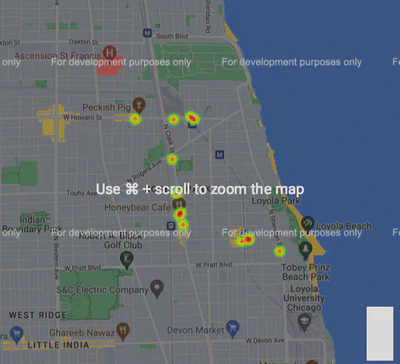Computing for the Sciences, Spring 2023

Details
Course: COMP 180-001 Computing and Data Analysis for the Sciences
Level: Undergraduate
Instructor: Daniel Moreira (dmoreira1@luc.edu)
Teaching Assistant: Jerome Santos (msantos@luc.edu)
Lectures: TUE, 4:15 to 6:45 PM, 103 Cuneo Hall
Office Hours: THR, 6:00 to 8:00 PM, and FRI, 10:00 AM to 12:00 PM, by appointment
Sakai: https://sakai.luc.edu/x/ouBYMu
Grades are now available.
Overview

Map with inspected Chicago food establishments generated during the course.
Regardless of their field, scientists’ work generates and consumes large troves of research data, whose effective, efficient, and reliable storage, management, processing, interpretation, presentation, and sharing are mostly possible due to the current computer systems. Besides mastering one’s own scientific area of research, mastering the usage of the available computing power to analyze data has become essential to foster steady and solid scientific progress. This course aims at training attendees to use modern computing tools and techniques to perform rapid data analysis and rich data presentation, both within collaborative environments and in scientific contexts. At the end of the course, students shall be well-versed in writing their own programs and leveraging up-to-date scientific libraries to collaboratively analyze their research data and richly present their findings.
Attending students are required to have taken MATH 117 (College Algebra) or have been placed in MATH 118 (Precalculus) or higher. Please refer to Sakai for having access to the materials, assignments, quizzes, announcements, grading, and progress of the course. This page is static and will not be updated.
Acknowledgements
This course is heavily based on Dr. Mohammed Abuhamad’s previous course. I sincerely thank Mohammed for kindly allowing me to rely upon his materials.
References
- Harrington, A. Hands-on Python Tutorial. Available at https://anh.cs.luc.edu/python/hands-on/3.1/index.html.
- The City of Chicago. Chicago Food Inspections Dataset. Available at: https://data.cityofchicago.org/Health-Human-Services/Food-Inspections/4ijn-s7e5.